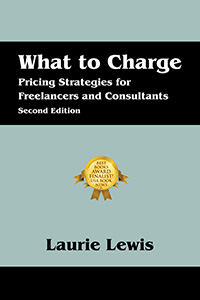 Synopsis:
Synopsis: This is the only book to focus exclusively on a question every freelancer faces repeatedly: what to charge. It answers this question in fifteen information-packed chapters that cover such issues as determining the right pricing method for a particular job (e.g., hourly or project rate), learning the going rate, and negotiating a fair fee.
What to Charge encourages business practices that freelancers may not have realized are crucial to good pricing decisions, including the best way to record the time on the job and analyses to perform after an assignment is finished. This award-winning book introduces the only two rules of pricing and explains why consistently applying them will assure a successful freelance career.
Working freelancers, both those who are just starting out and those who have been self-employed for years, have consistently praised
What to Charge: Pricing Strategies for Freelancers and Consultants. As for more formal recognition of its value, the book tied for first place in the Business/Sales/Economics category and ranked second in the Writing/Publication category of the 2012 Reader Views Literary Awards competition. Previously, it was a finalist for the 2011 USA Best Books award in the Business: Writing and Publishing category.
Although
What to Charge: Pricing Strategies for Freelancers and Consultants is a few years old, it is as relevant now as the day it was published. Rather than suggest fees for particular types of freelance work, the book presents techniques for pricing and managing a freelance business. These techniques are timeless and time-tested and are applicable for all self-employed service providers, including writers, editors, graphic designers, website developers, virtual assistants, and other traditional and modern-day freelancers.
Amazon |
Kindle |
Barnes and Noble |
Nook |
Outskirts Press |
National Association of Independent Writers and Editors
Excerpt from"What to Charge"
Initially, Quentin worried that the rate he quoted would be so high that he’d lose the job or so low that he’d live to regret it. But he learned from his mistakes and made some smart moves that transformed his business from one that was just muddling along. For example:
- Quentin made an effort to find out the going rate for different types of work. He spoke with colleagues in the field (some people might call them “the competition”) and honed his skills at interviewing potential clients so he could identify their budgetary constraints.
- He experimented with different methods of pricing. Sometimes he charged an hourly fee, but other times he set a per diem rate. He arranged a retainer with a steady client and learned to calculate project rates so that the work would be profitable.
- He changed his method of record keeping. Quentin began to log his time by the tasks that he performed. When he needed to calculate a realistic project rate or per diem fee, he used task logs from previous assignments to come up with a figure that reflected the anticipated work.
- Quentin became a tough negotiator. Before talking money with a client, he figured out exactly what he wanted and needed to earn, how low he was willing to go, and what concessions he expected if he couldn’t get top dollar.
- Quentin retrospectively analyzed his pricing decisions at the end of each job. He calculated how much he could have earned if he had charged on a different basis. At the end of the year, he tallied his earnings from each client and examined them side by side.
 Laurie Lewis:
Laurie Lewis: Not to be confused with the singer of the same name, this Laurie Lewis started her freelance writing and editing business nearly 30 years ago. Specializing in medical publications, she works on material for all audiences, including physicians, nurses, and patients. She also shares what she has learned about self-employment in books and presentations for freelancers. Laurie Lewis lives in New York City.
AUTHOR LINKS
LinkedIn:
http://www.linkedin.com/profile/view?id=175880582&trk=nav_responsive_tab_profil
Profile through a professional association:
http://www.the-efa.org/dir/memberinfo.php?mid=1757
Website through a professional association:
http://laurielewis.naiwe.com/
Email:
lewislaurienyc@gmail.com
 Synopsis: This is the only book to focus exclusively on a question every freelancer faces repeatedly: what to charge. It answers this question in fifteen information-packed chapters that cover such issues as determining the right pricing method for a particular job (e.g., hourly or project rate), learning the going rate, and negotiating a fair fee. What to Charge encourages business practices that freelancers may not have realized are crucial to good pricing decisions, including the best way to record the time on the job and analyses to perform after an assignment is finished. This award-winning book introduces the only two rules of pricing and explains why consistently applying them will assure a successful freelance career.
Working freelancers, both those who are just starting out and those who have been self-employed for years, have consistently praised What to Charge: Pricing Strategies for Freelancers and Consultants. As for more formal recognition of its value, the book tied for first place in the Business/Sales/Economics category and ranked second in the Writing/Publication category of the 2012 Reader Views Literary Awards competition. Previously, it was a finalist for the 2011 USA Best Books award in the Business: Writing and Publishing category.
Although What to Charge: Pricing Strategies for Freelancers and Consultants is a few years old, it is as relevant now as the day it was published. Rather than suggest fees for particular types of freelance work, the book presents techniques for pricing and managing a freelance business. These techniques are timeless and time-tested and are applicable for all self-employed service providers, including writers, editors, graphic designers, website developers, virtual assistants, and other traditional and modern-day freelancers.
Amazon | Kindle | Barnes and Noble | Nook | Outskirts Press | National Association of Independent Writers and Editors
Excerpt from"What to Charge"
Initially, Quentin worried that the rate he quoted would be so high that he’d lose the job or so low that he’d live to regret it. But he learned from his mistakes and made some smart moves that transformed his business from one that was just muddling along. For example:
Synopsis: This is the only book to focus exclusively on a question every freelancer faces repeatedly: what to charge. It answers this question in fifteen information-packed chapters that cover such issues as determining the right pricing method for a particular job (e.g., hourly or project rate), learning the going rate, and negotiating a fair fee. What to Charge encourages business practices that freelancers may not have realized are crucial to good pricing decisions, including the best way to record the time on the job and analyses to perform after an assignment is finished. This award-winning book introduces the only two rules of pricing and explains why consistently applying them will assure a successful freelance career.
Working freelancers, both those who are just starting out and those who have been self-employed for years, have consistently praised What to Charge: Pricing Strategies for Freelancers and Consultants. As for more formal recognition of its value, the book tied for first place in the Business/Sales/Economics category and ranked second in the Writing/Publication category of the 2012 Reader Views Literary Awards competition. Previously, it was a finalist for the 2011 USA Best Books award in the Business: Writing and Publishing category.
Although What to Charge: Pricing Strategies for Freelancers and Consultants is a few years old, it is as relevant now as the day it was published. Rather than suggest fees for particular types of freelance work, the book presents techniques for pricing and managing a freelance business. These techniques are timeless and time-tested and are applicable for all self-employed service providers, including writers, editors, graphic designers, website developers, virtual assistants, and other traditional and modern-day freelancers.
Amazon | Kindle | Barnes and Noble | Nook | Outskirts Press | National Association of Independent Writers and Editors
Excerpt from"What to Charge"
Initially, Quentin worried that the rate he quoted would be so high that he’d lose the job or so low that he’d live to regret it. But he learned from his mistakes and made some smart moves that transformed his business from one that was just muddling along. For example:
 Laurie Lewis: Not to be confused with the singer of the same name, this Laurie Lewis started her freelance writing and editing business nearly 30 years ago. Specializing in medical publications, she works on material for all audiences, including physicians, nurses, and patients. She also shares what she has learned about self-employment in books and presentations for freelancers. Laurie Lewis lives in New York City.
AUTHOR LINKS
LinkedIn: http://www.linkedin.com/profile/view?id=175880582&trk=nav_responsive_tab_profil
Profile through a professional association: http://www.the-efa.org/dir/memberinfo.php?mid=1757
Website through a professional association: http://laurielewis.naiwe.com/
Email: lewislaurienyc@gmail.com
Laurie Lewis: Not to be confused with the singer of the same name, this Laurie Lewis started her freelance writing and editing business nearly 30 years ago. Specializing in medical publications, she works on material for all audiences, including physicians, nurses, and patients. She also shares what she has learned about self-employment in books and presentations for freelancers. Laurie Lewis lives in New York City.
AUTHOR LINKS
LinkedIn: http://www.linkedin.com/profile/view?id=175880582&trk=nav_responsive_tab_profil
Profile through a professional association: http://www.the-efa.org/dir/memberinfo.php?mid=1757
Website through a professional association: http://laurielewis.naiwe.com/
Email: lewislaurienyc@gmail.com

No comments:
Post a Comment